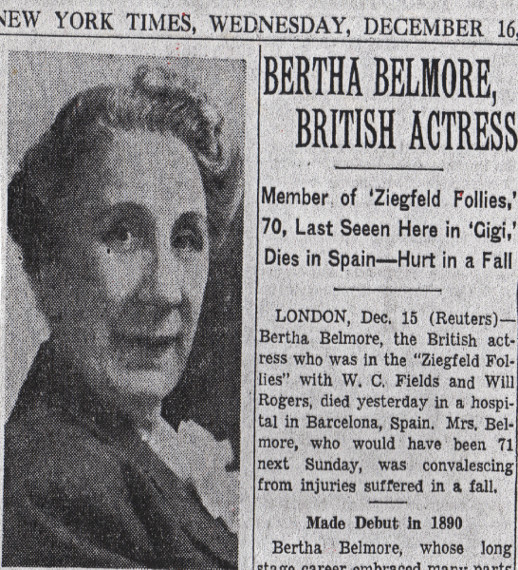Death: December 15th 1953, Barcelona, Catalonia, Spain
Born to William Henry Cousins and Mary Anne Pearce, both from Burnage, a suburb in Manchester. Bertha didn’t come from a theatrical family, and so pursued an acting career initially without the advantage of influential connections.
In 1889, Bertha first appeared on stage as one of the ‘Six Sunbeams’, a juvenile touring troupe. They sang, danced, and recited from fairy tales. Bertha used to play the xylophone while standing on a box.
1890, toured with the John Tiller Girls around Great Britain, and around Europe with ‘Harwood’s Juveniles’ as a progression from the Six Sunbeams. Her professional acting debut was at age 8 at Princes Theatre, Manchester, in the children’s Christmas pantomime Robinson Crusoe. For many seasons Bertha would perform in pantomimes as the principal boy. Over the course of seven years, Bertha would also appear in leading variety theatres as one of the ‘Belmore Sisters’.
In June 1905, Bertha married actor Herbert Belmore, born in 1875, a son of the great actor George Benjamin Belmore and actress Alice Cook. Herbert’s brothers and sisters all had stage performance careers also. Bertha and Herbert met on the stage. However, for reasons of health, Herbert had to move to America, and Bertha followed a year later, which initiated her long acting career in the US. Herbert also continued to act and be a stage manager, although not to the same degree of success and fame as his wife.
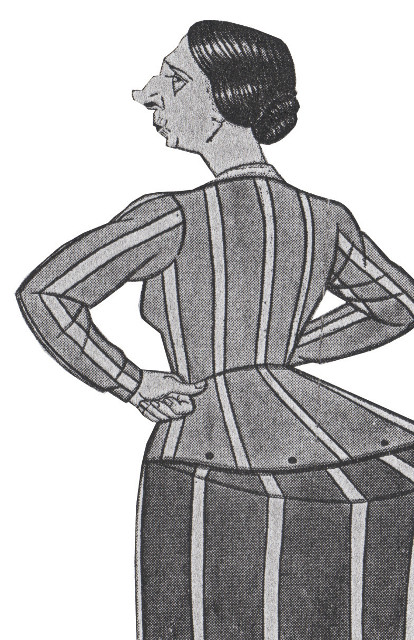
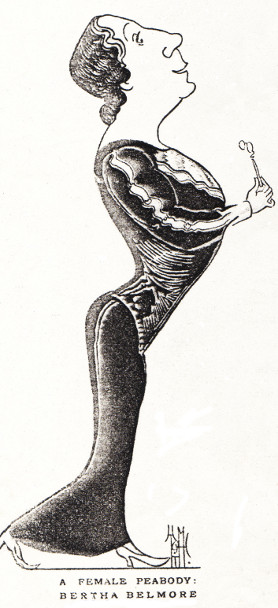
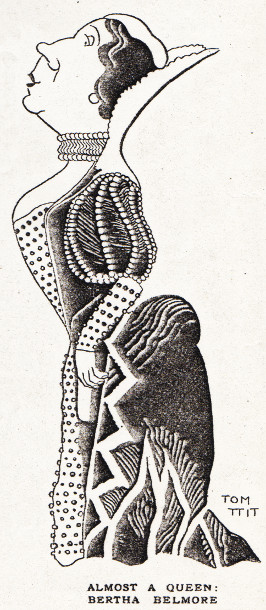
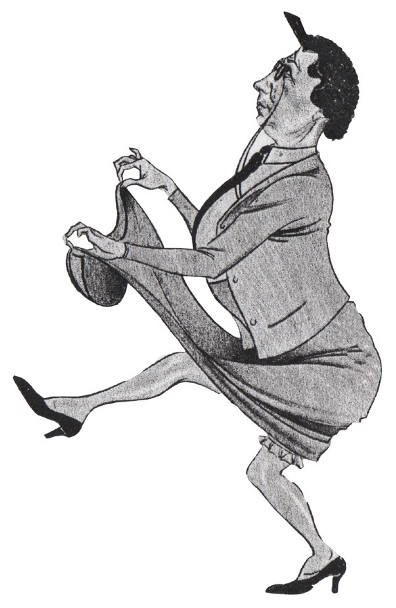
1910
- As You Like It, on the Schenley lawn in Pittsburgh
1911, toured America with the Ben Greet’s Pastoral Players, known a repertoire that included Shakespeare. Bertha also played many of the Bard’s heroines in William Faversham’s Repertory Company. Additionally she was in Florenz Ziegfeld’s ‘Ziegfeld Follies’ touring shows with W. C. Fields and Will Rogers for three years.
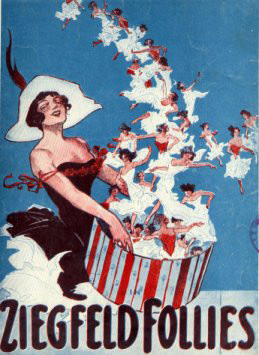
1912
- Julias Ceasar, at Lyric Theatre, Bertha’s New York debut performance, with William Faversham.
1920
- Irene, at Empire Theatre, a musical comedy by James Montgomery. Bertha’s debut performance in London.
1923
- The Sporting Thing to Do, at Ritz Theatre, a play by Thompson Buchanan. Also starred her husband Herbert, who was also the stage manager for this performance.
- Grounds for Divorce, at Empire Theatre
1925
- Ziegfeld Follies, Ohio Theatre and New Amsterdam Theatre with W. C. Fields.
1927
- The Cradle Snatchers, at His Majesty’s
1929
- Whispering Gallery, at Forest Theatre. Play by Percy Robinson and Terrence de Marney.
1930
- Show Boat, at Casino, New York. Adapted from a novel by Edna Ferber. Although Bertha had a successful audition for the role of Parthy Ann Hawkes, her commitments in Australia, along with an error in foresight as to how popular Show Boat would be from just reading the script, meant that she was unable to take the role straight away. Eventually took over from Edna May Oliver in the role.
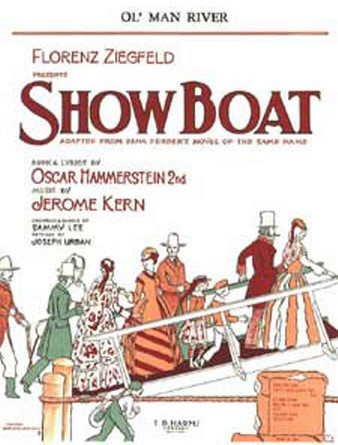
1931
- Let’s Ask the Lacks, in New York
1932
- The Warrior’s Husband, at Morosco, New York. This play was later remade as By Jupiter (more details below, in 1942). Incidentally, it also starred Katharine Hepburn, and started her legendary career after a break-out performance, whereas prior to this she had not been very successful as an actress.
- Showboat, New York, Zeigfeld’s final production
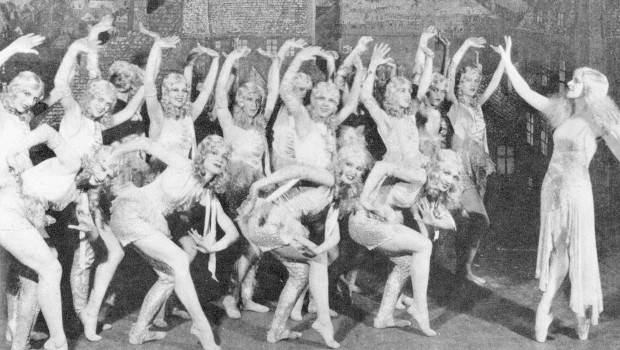
1933
- Going Gay, a UK movie musical, directed by Carmine Gallone
- Happy, a UK movie musical comedy, based on a play. Directed by Frederic Zelnik.
- Keep It Quiet, a UK movie directed by Leslie S. Hiscott.
- Kiss me Goodbye, movie ?
1934
- “Yes Madam?” at the London Hippodrome, a musical comedy. “Miss Bertha Belmore’s sterling art simmers on an elderly spinster’s hob before boiling over in Edwardian song and dance”.
- Reunion in Vienna, at Lyric Theatre, London. Bertha had to smoke cigars in every act of this production. As she wasn’t used to even smoking cigarettes, she almost fainted in the final act, and the production team had to find specially made milder cigars so Bertha could continue with the role.
- Are You a Mason, a UK movie comedy based on a play, directed by Henry Edwards.
- Blossom Time, a UK movie musical romance, directed by Paul L. Stein
- April Blossoms, movie
- Over the Garden Wall, a UK movie based on a play, directed by John Daumery.
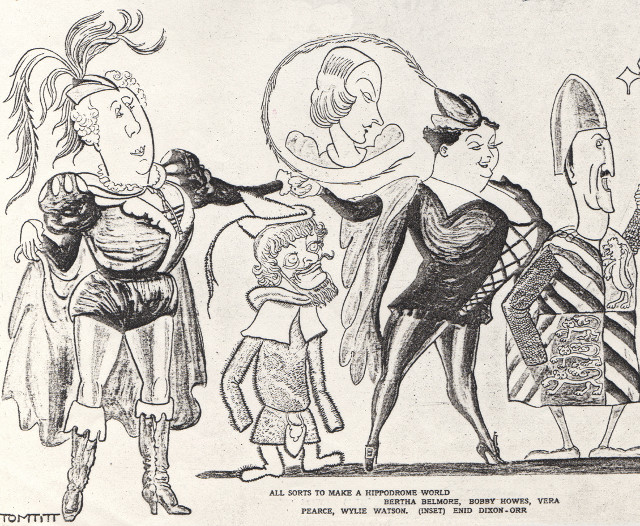
1935
- You Never Can Tell, a UK movie
- Royal Cavalcade, a UK movie drama
- Be Careful, Mr. Smith, a UK movie comedy directed by Max Mack.
- So You Won’t Talk, a UK movie comedy, directed by William Beaudine.
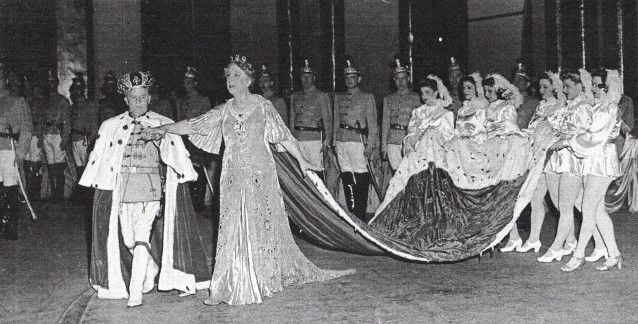
1936
- In The Soup, a UK movie, directed by Henry Edwards. A comedy based on a play.
- Broken Blossoms, a UK movie drama based on a novel by Thomas Burke, adapted by Emlyn Williams and directed by John Brahm. A remake of D. W. William’s silent film masterpiece, known sometimes as The Yellow Man and The Girl, from 1919.
- Give Me a Ring, a play at the London Hippodrome that was also filmed with Bertha and released as a movie production called Give Her a Ring, directed by Arthur B. Woods. Hippodrome performances were well known for featuring dancing girls.
1937
- Big Business, at the London Hippodrome. Also starred Bobby Howes and Vera Pearce. One press article said “The way Vera Pear skimmed along the main on Thursday evening was an eye-opener. While this superb artist’s genius is for attack, that of Miss Bertha Belmore is for defence. She stands in the centre of these musical comedies immune from assault, like one of my Uncle Toby’s outworks. She is the lidless-eyed dragon of all the proprieties, and I can think of no higher praise than that Dame Madge Kendal would have approved of her. Is it conscious or subconscious imitation which makes Miss Belmore wear dresses of the exact shade of puce, and occasionally break into the same heliotropic smile? Whatever the reason, the resemblance is complete down to the Parma Violets in the bun.” The show had extra scenes added to it during its run, with Bertha given a “first-class song-and-dance number, Flannel Foot, all to herself”.
- Please Teacher!, a play at the London Hippodrome with Bobby Howes and Vera Pearce who became regular co-stars with Bertha. Vera and Bertha were joint headmistresses, with Bertha described in the press as “amusingly dragon-like”, who intimidated Bobby, which became a recurring theme in their work together. It was filmed as a movie production the same year, also with Bertha, directed by Stafford Dickens.
- Keep it Quiet
- Virginia, at Center Theatre, New York
- Over the Garden Wall
- Oh! You Letty, at Palace Theatre London, a musical comedy with husband Herbert Belmore
- Over She Goes
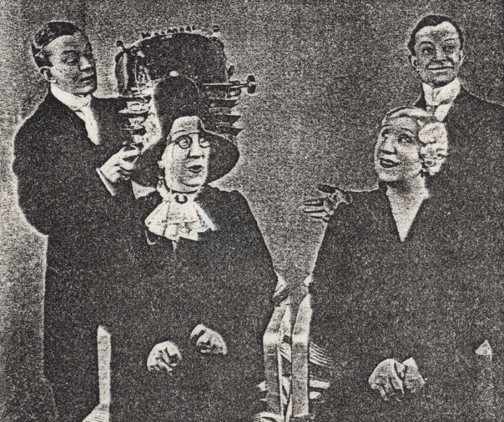
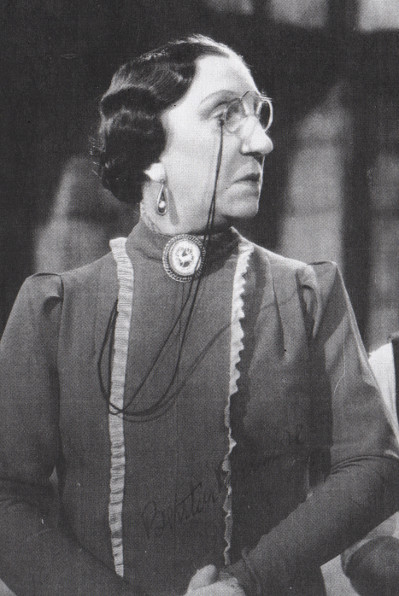
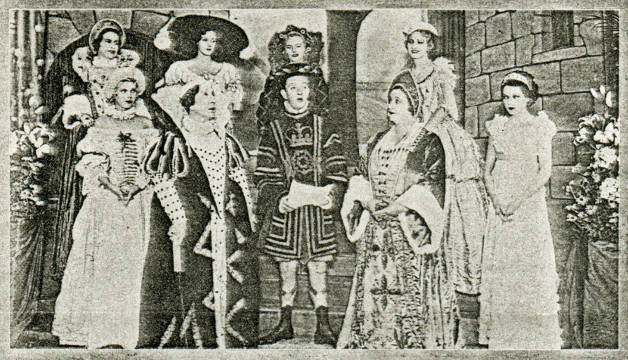
1938
- Queer Cargo, a UK movie directed by Harold D. Schuster. Also known as Pirates of the Seven Seas.
- Over she Goes, a UK movie musical comedy based on a play, directed by Graham Cutts.
- Hold My Hand, a UK movie based on a play, directed by Thornton Freeland.
- Convict 99, a UK movie comedy directed by Marcel Varnel.
- Weddings are Wonderful, a UK movie directed by Maclean Rogers.
- Yes Madam?, at London Hippodrome, a musical comedy alongside Bobby Howes and Vera Pearce once again. Bertha’s husband Herbert was the producer.
- Bobby Get Your Gun, at Adelphi Theatre, London
- Let’s Make a Night of It, a UK movie directed by Graham Cutts.
Bertha was asked what was the biggest disappointment in theatre? Her reply was “I think it was over Night Must Fall. Emlyn Williams, a great friend of mine, had written the part of Mrs. Bramson especially for me. He said he used to write the lines with me in mind. I was playing in Yes Madam at the time and we had another six months to run, so of course I wasn’t available. I went to the midnight performance of Night Must Fall, and after it was over I said to my husband, ‘Get a taxi and let’s go home.’ ‘What’s the matter? Are you feeling ill?’ he asked. ‘Never mind, get a taxi,’ was all I could say! And I went home and cried for hours! Such a wonderful part in a grand play, and I had missed it! The fact that Dame May Whitty played it so marvellously probably made me feel even worse! But that’s the theatre. You have to take the rough with the smooth.”
1939
- Discoveries, a UK movie musical showcasing new talent, based on Carroll Levis’ radio programme of the same name.
- Yes Madam, a UK movie directed by Norman Lee, based on the Hippodrome play which Bertha also starred in.
1940
- Nap Hand, at Aldwych, London
- Johnny Belinda, at Belasco’s Theatre, New York
- She Couldn’t Say No, a US movie directed by William Clemens, based on a play.
- The Midas Touch, a UK movie directed by David MacDonald
1941
- Would be Gentleman, at Touring Theatre
- Pirates of the Seven Seas F?
1942
- By Jupiter, at Sam S. Shubert Theatre, New York. A Broadway musical by Richard Rodgers and Lorenz Hart based on The Warrior’s Husband, a play by Julian Thompson in 1931, where Bertha played the same role. A dance routine between Bertha and Ray Bolger, the lead of the show, is one of the biggest highlights. For a while, possibly only in pre-production, this play was also called “All’s Fair” in early press materials. “Bertha Belmore as an Amazonian dowager stops the show with her lively dances and robust jokes”.
- Heart of a City, at Henry Miller’s Theatre New York, by Leslie Storm
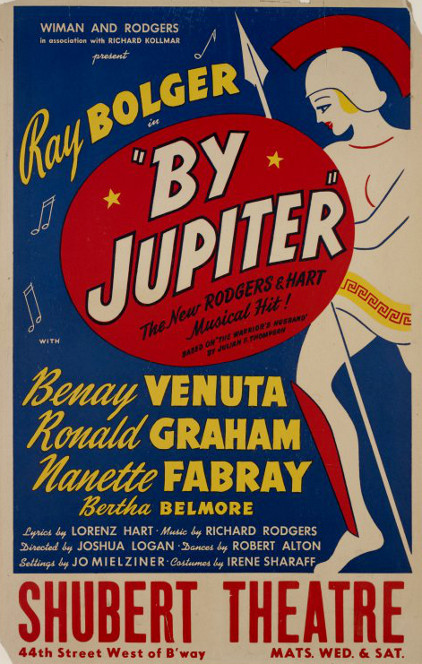
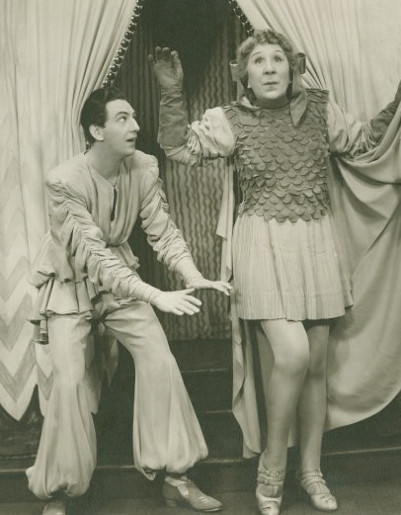
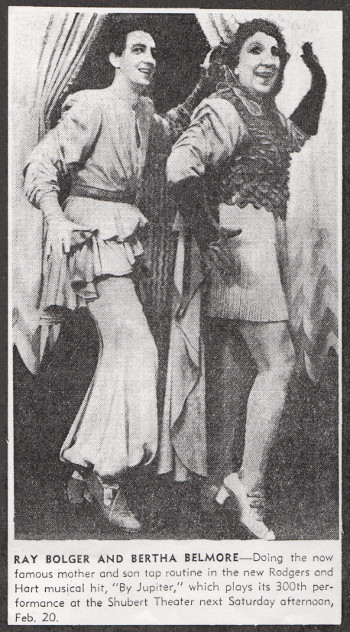
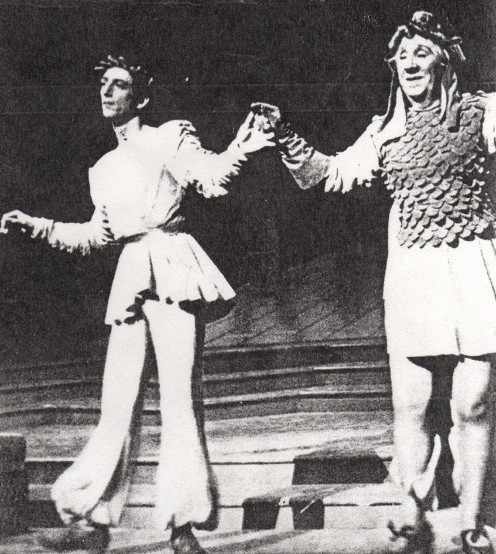
1943
- By Jupiter, at Sam S. Shubert Theatre, New York
- The Naked Genius, at Plymouth Theatre, New York. A comedy by Gipsy Rose Lee
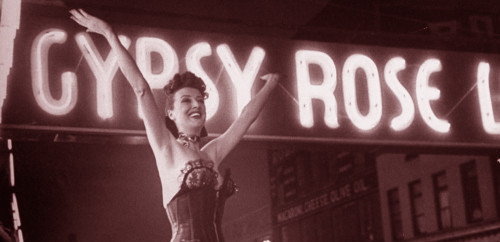
1944
- Rhapsody, at Century Theatre, New York, an operetta by Fritz Kreisler
1945
- The Would-Be Gentleman, on tour
- Marriage is for Single People, at the Schubert Theatre and New Haven and Wilbur Theatre, New York. “Bertha Belmore gives veteran skill to a farcical matron assignment”. The play is described as an “Amusing Cartoon” by reviewer Warren Storey Smith, who goes on to say “Known to fame is Bertha Belmore, who most capably assumes the role of Mrs. Sibyl Hecuba, mother of Playwright Reginald, whose proposal to Lottie is one of his numerous and celebrated pranks, and who finally resolves the difficulties and complications of the plot by another one that will not be revealed here”.
1946
- Antigone and the Tyrant, at Court Theatre, New York. Adapted by Lewis Galantiere from the play by Jean Anouilh. Also starred Cedric Hardwicke.
1947
- Peace Come to Peckham, at Princes Theatre, London. A comedy by R. F. Delderfield. Featured Lionel Blair in an early role.
- The Late Christopher Bean, at Civic Theatre, Chicago. By Sidney Howard.
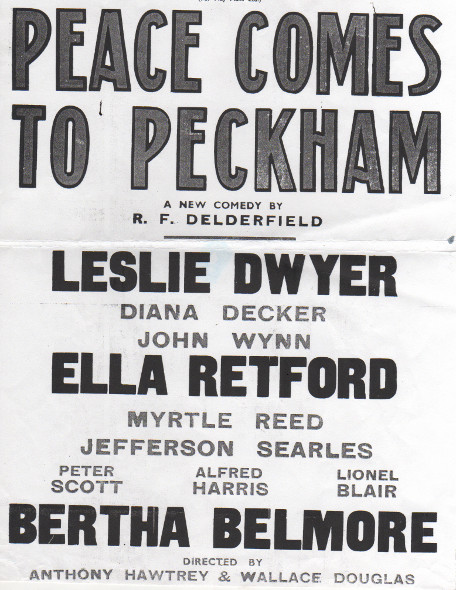
1948
- Rosalie, a Civic Light Opera production in Pittsburgh
Bertha was quoted in a Pittsburgh local newspaper as saying, about her favourite play ‘By Jupiter’ “I stopped the show every night when I did a tap dance. I was 60 at the time”. The day before this was printed, the article also states that Bertha and her co-star in ‘Rosalie’ Jackie Gleason proved that between them they could lift her car, an Austin.
1949
- The Browning Version, at Coronet Theatre, New York. A one-act tragedy. Also starred Louis Hector, the ex-husband of Bertha’s niece Jessie Belmore, playing a pompous headmaster.
- A Harlequinade, at Coronet Theatre, New York. A one-act satiric farce, performed in the same evenings as The Browning Version. Both plays were originally written by Sir Terrence Rattigan, a great dramatist of the 20th The press said “The ever popular Bertha Belmore also has a field day in “A Harlequinade,” as Dame Maud Gosport. She won salvos of applause from her devoted fans”, and “Bertha Belmore is Dame Maud, and plays with imposing displacement in a grand manner that makes lines sound funnier than they are”. Louis Hector starred in this also.
- The Morey Amsterdam Show, a US TV series
- Caesar and Cleopatra, at The National Theatre, New York. Written by George Bernard Shaw in 1898 and first staged in the UK in 1901. A comedy that is a prequel to Shakespeare’s Antony and Cleopatra. Also starred Lili Palmer as Cleopatra and Cedric Hardwicke as Julius Caesar, who was also the director of the show. Bertha is described in the press as “something extra special in the role of Cleopatra’s lady-in-waiting”
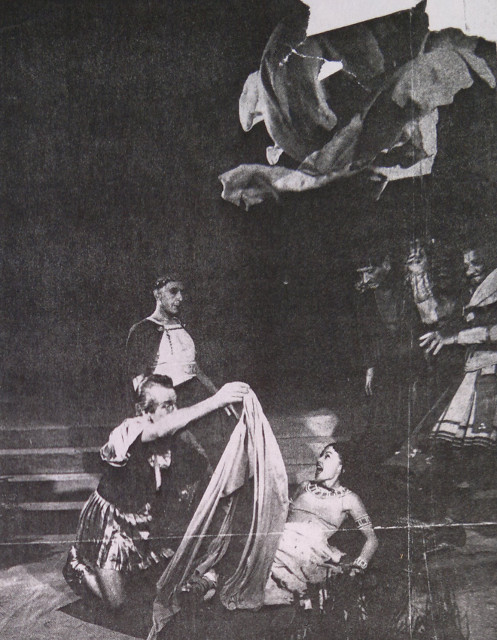
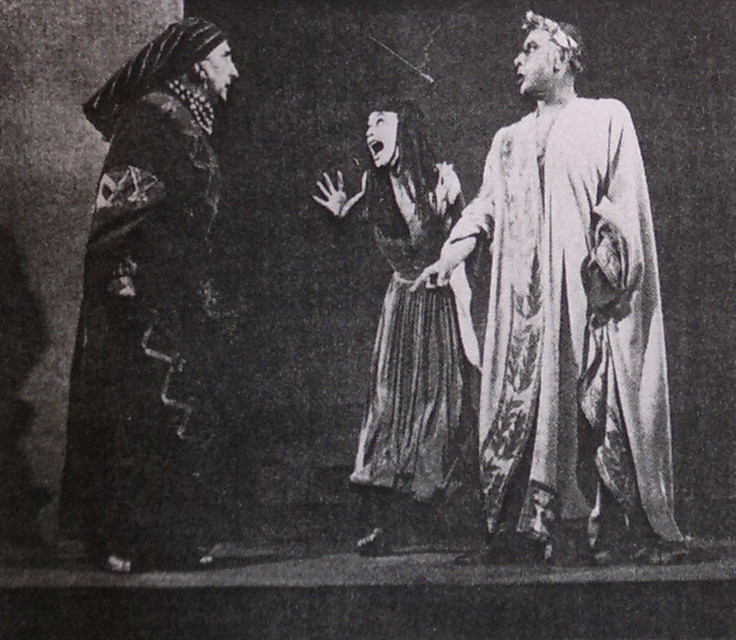
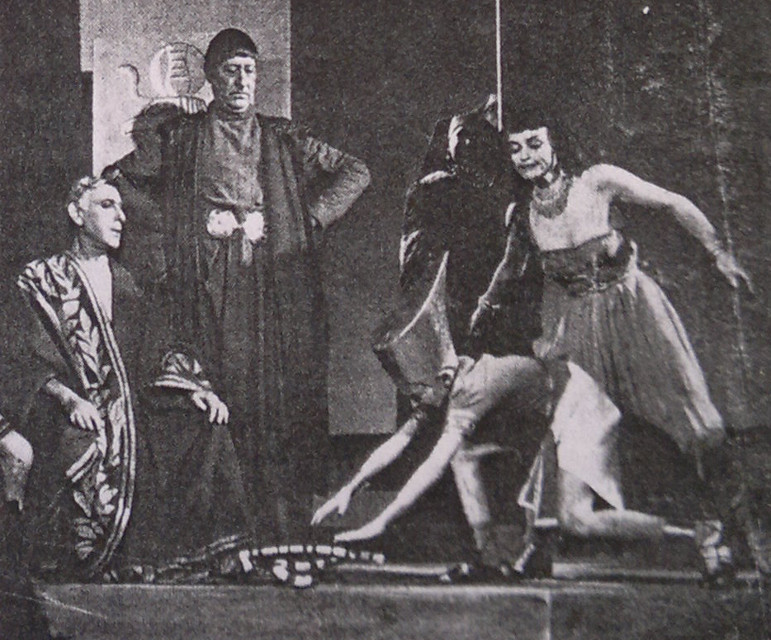
In 1950, Doris Wallace, the daughter of Alice Belmore Cooper Cliffe (sister of Bertha’s husband Herbert) and Henry Cooper Cliffe, died in an elevator accident on March 1st at Grand Central Station in New York. Bertha and Herbert Belmore flew out in order to take custody of Clifford Wallace, Doris’ sixteen year old son. Although Clifford’s father had divorced Doris a long time prior to the incident and had nothing to do with Clifford for at least a dozen years, Bertha and Herbert had to fight Clifford’s father in court in a custody battle.
Bertha said “The boy’s father never supported him or made any attempt to see him during the last 10 years. My husband, who was his mother’s uncle, and I, love him very much and want him to live with us. We have no children, and will treat Clifford as our own”. Doris’ parents had originally objected to the marriage between her and Clifford’s father.
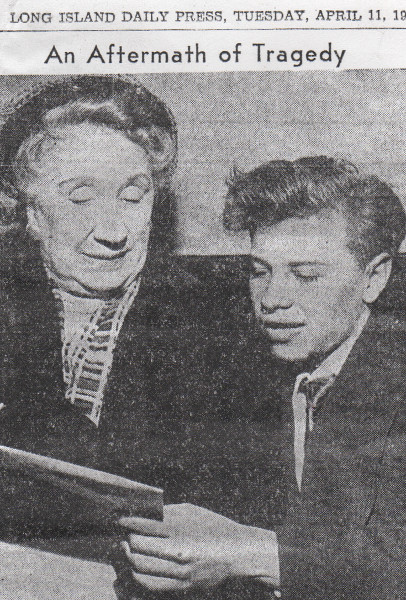
1950
- The Philco-Goodyear Television Playhouse, a US TV series. This live dramatic series featured original stories and adaptations of novels and plays during its eight year run. During the first year, the show was sponsored by the Actor’s Equity Association and featured adaptations of Broadway plays and musicals.
- The Trap (Three Blind Mice), a US TV series, with Leslie Nielson
- Blue for a Boy, at Theatre Royal Nottingham, and His Majesty’s Theatre London. Bertha’s last West End performance.
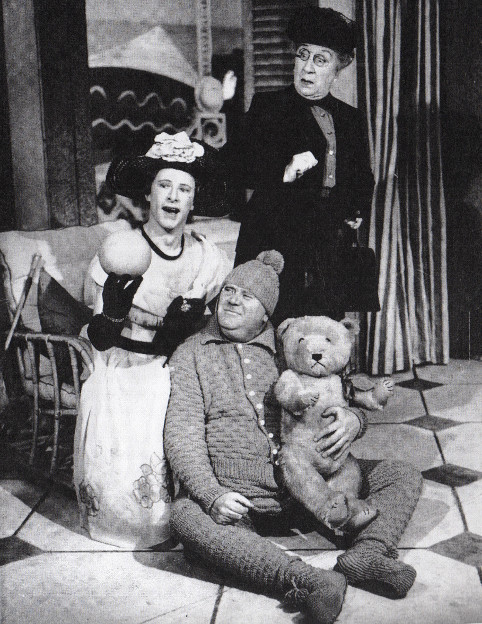
1951
- Gigi, at Fulton Theatre, New York, with Audrey Hepburn. Based on Colette’s 1945 novel of the same name. Bertha’s final major stage role. For her performance she was awarded the American Theatre Award. The New York Herald Tribune said “Miss Belmore is five-carat all the way”.
- The Web, TV series. Live dramas based on stories by members of the Mystery Writers of America.
- Studio One, a US TV series that won several Emmy awards.
- The Ford Theatre Hour, a US TV series sponsored by the Ford Motor Company.
- Martin Kane, Private Eye, US TV series
1953
- So You Won’t Talk F?
Bertha’s recreational interests included motoring, golf and swimming. She had a home in Long Island, New York, and also in Knightsbridge, London.
She used to appear many times in small, informal shows at Cherry Grove on the Great South Beach in South Carolina. Once she had a musical written about her reign as the president of the Cherry Grove Art Project, called ‘Berthe of a Nation’.
Bertha died just a few days short of turning 71 in a hospital in Barcelona, Spain, one year after her husband Herbert had died in New York. She had suffered terrible injuries from a fall down marble steps while on holiday with a long-time friend Mrs. Florence Carless. Unfortunately her body was held in a mortuary for several months and not returned to Long Island and the grave of her husband due to a bill of £1,200 for treatment and embalming at the hospital. Although Bertha’s estate was estimated to be worth over £50,000, a flaw in America’s legal system meant no money was available immediately, resulting in much communication between relatives, friends, lawyers, the British Consulate and associates in London and across the Atlantic to try and resolve this.
